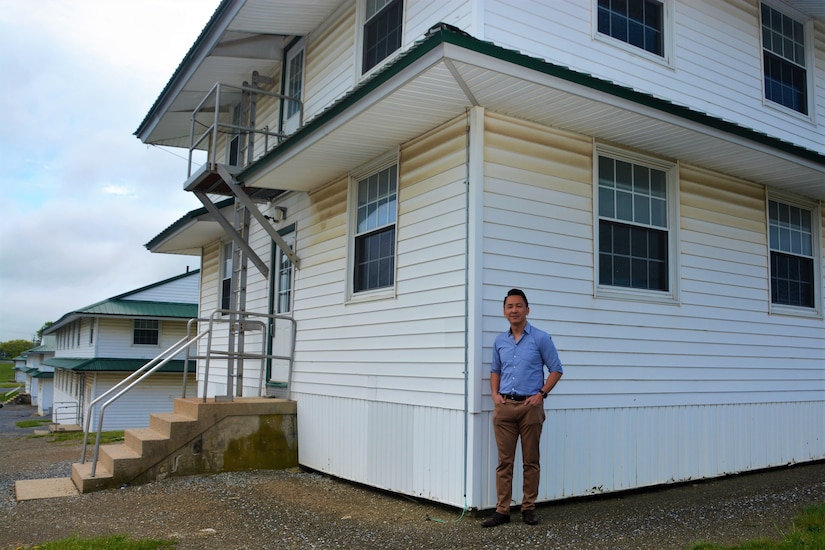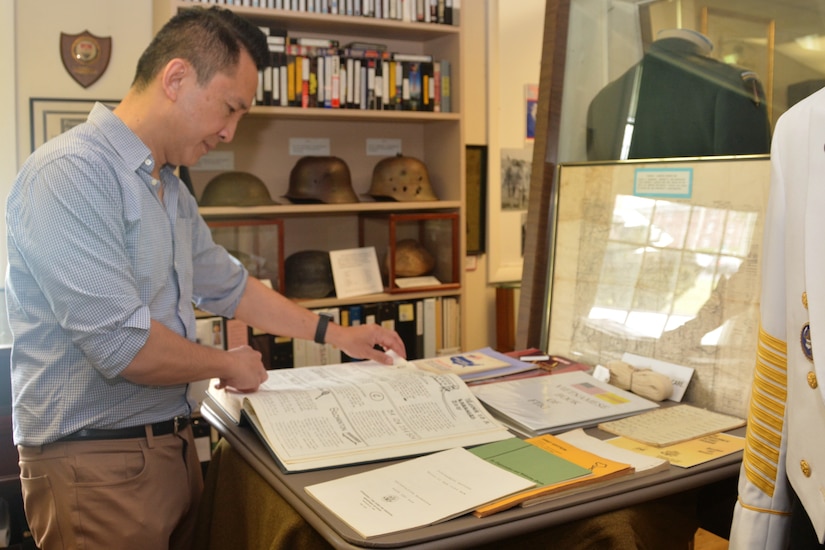Brad Rhen writes about Viet Thanh Nguyen’s experiences as a refugee who arrived at Fort Indiantown Gap in Pennsylvania in the summer of 1975 for Fort Indiantown Gap.


FORT INDIANTOWN GAP, Pa. –
Viet Nguyen doesn’t remember much about the time he spent at Fort Indiantown Gap in the summer of 1975.
He remembers the barracks – World War II-era open-bay barracks – and that it was crowded. That’s about it.
“I remember being here,” he said. “I remember the barracks. I have flashes of memory of that. It was crowded. I remember that, as well.”
Nguyen, who was one of more than 20,000 Vietnamese and Cambodian refugees that were housed at Fort Indiantown Gap after the Vietnam War, returned to the installation on May 13 for the first time since 1975.
After a visit to the Pennsylvania National Guard Military Museum, where he viewed items concerning the Vietnamese refugees, he visited a barracks building in Area 4 that is similar to the one he and his family stayed in in 1975. The actual building they stayed in has been torn down.
“Actually, from what I remember, it looked pretty much like what I saw today,” he said.
Nguyen was born in Ban Mê Thuột – now Buôn Mê Thuột – Vietnam. Following the North Vietnamese invasion of South Vietnam in 1975, he and his family left their home, never to return. They walked about 180 kilometers to a port, where they eventually got on a boat to Saigon. Nguyen was 4 years old at the time.
“My hometown was the first one captured in the final invasion,” Nguyen said. “My father was in Saigon on business, and the town was captured and communications cut off, and my mom had to make some very difficult decisions to flee with my brother and me and leave behind my adopted sister to take care of the property. We thought we’d be coming back but we never did.
“It was a huge exodus,” he added. “Everything was collapsing. The military was fleeing, refugees were fleeing. We had to make it about 180 kilometers to the nearest port city and try to get on a boat to Saigon, which we were lucky enough to do because it was very chaotic from everything that I read. We made it Saigon, found my father, and a few weeks later Saigon was captured, too, and we had to try to escape.”
Nguyen and his family made their way onto a boat that took them to Guam, from where they traveled to the United States.
They eventually made it to Fort Indiantown Gap, one of four camps established in the U.S. for Vietnamese and Cambodian refugees. After several months at FTIG, Nguyen and his family moved to Harrisburg, where they lived until 1978, before moving to San Jose, California, which he said was home to one of the largest Vietnamese communities in the U.S.
After high school, Nguyen attended the University of California-Berkeley, where he graduated with degrees in English and ethnic studies. He also earned a Ph.D. in English at Berkeley.
Nguyen is currently a professor of English, American Studies and Ethnicity, and Comparative Literature at the University of Southern California and an author. He has written several books, and his novel “The Sympathizer” won the 2016 Pulitzer Prize for Fiction and numerous other awards. He has appeared on several talk shows, including Late Night with Seth Myers.
Nguyen teaches an class at USC about the Vietnam War. As a former Vietnamese refugee, he said the class is very personal to him.
“I grew up in the United States, so I’m very familiar with the American version of the war, which for the most part disregards or marginalizes the Southeast Asian experiences, so much of my writing comes out of that recognition and the attempt to center Vietnamese experiences,” he said.
Nguyen said his family never talked about their time at Fort Indiantown Gap. Probably, he said, because he doesn’t think it was a fun experience.
“My parents were in their 40s, they came out of poverty in Vietnam and were very successful, then they lost almost everything and they had to come live in the barracks,” he said. “I’m not sure they want to talk about that experience.”
Although brief, Nguyen said his visit to Fort Indiantown Gap was nice. It helped him learn about a time in his life he mostly doesn’t remember and understand the struggles his parents and others in their generation went through.
“I have no memories of what life was like here other than it was crowded in the barracks, so coming back here and getting the tour and asking questions helped me to reconstruct what daily life was probably like for the refugees,” he said. “They went from places where they had their own homes, their own kitchens, their own bathrooms, and now they have to share everything with everybody. Even though it was a great opportunity to start a new life, it was also difficult for a lot of people.”


